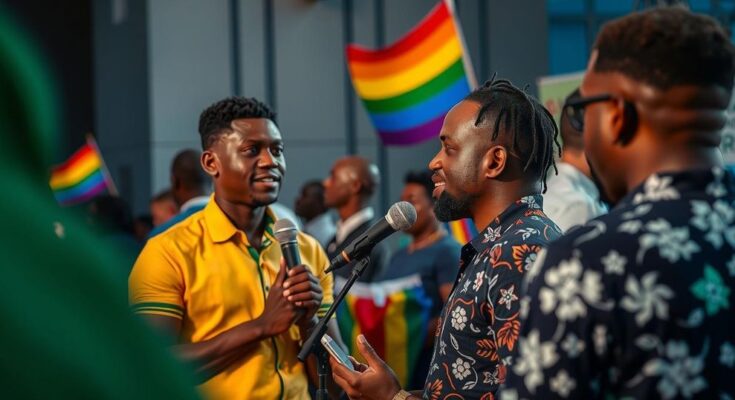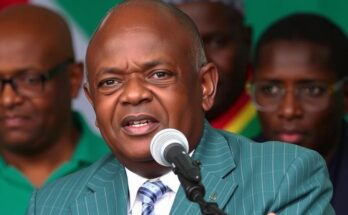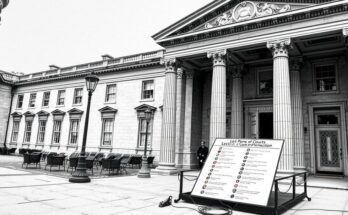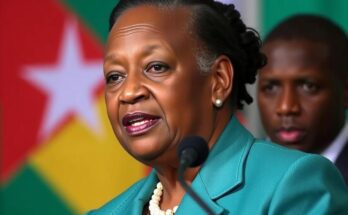In the lead-up to Ghana’s general elections, leading candidates have adopted anti-LGBTQ+ positions to garner support as a controversial bill proposing harsher penalties for LGBTQ+ identities awaits Supreme Court review. The legislation could intensify discrimination against the LGBTQ+ community, intensifying fears surrounding personal safety and rights amidst a politically charged environment.
In Ghana, the upcoming general elections present a daunting reality for the LGBTQ+ community, as all prominent presidential candidates have garnered support by endorsing stricter measures against gay rights. The law under consideration, passed by Parliament this year, proposes severe penalties, including imprisonment for individuals identifying as LGBTQ+. The Supreme Court is scheduled to deliberate on the constitutionality of this bill shortly after the elections.
The ruling party’s candidate, Mahamudu Bawumia, has publicly expressed his intent to sign the law, while his primary opponent, former president John Dramani Mahama, has advocated for enhanced legislation against LGBTQ+ activities. The proposed law, which broadens the definition of illegal conduct and increases penalties for same-sex relationships, poses significant threats to sexual and gender minorities, according to human rights organizations.
Abena, an LGBTQ+ advocate, highlighted the emotional turmoil faced by community members, stating, “These are people who are actually supposed to protect me. My vote and the rest of the community’s will put them in a position of leadership. I feel like I do not belong.” Ghana already criminalizes same-sex sexual activities, but the new legislation would further intensify the existing penalties and extend punishments to allies of LGBTQ+ individuals.
The dialogue surrounding the bill has exacerbated hostile attitudes toward the LGBTQ+ community, with a survey indicating that only 7% of Ghanaians support same-sex relationships. Religious groups have actively campaigned for the bill’s enactment, framing LGBTQ+ identities as contrary to Ghanaian cultural and Christian values. The widespread support for the bill has fostered an increasingly dangerous atmosphere for LGBTQ+ individuals, amplifying fears of violence and discrimination.
Michael Akagbor of the Centre for Democracy and Development Ghana noted that the political rivalry has led to a scenario where anti-LGBTQ+ sentiments are central to the electoral discourse. The anticipated legal ruling regarding the bill’s constitutionality looms over the elections, yet many fear the implications of any final decision will come too late for community members to make informed voting choices.
Internationally, responses have condemned the proposed legislation, with the European Union expressing concerns about its contradiction to both Ghanaian and international human rights obligations. Should the bill become law, repercussions could include financial consequences for Ghana, as donor nations may reconsider their support.
The intersection of politics, law, and public sentiment in Ghana creates a precarious environment for LGBTQ+ individuals, compelling many to navigate their personal safety with heightened caution while awaiting clarity on their rights in the context of the upcoming elections. Abena poignantly articulated the dire situation: “I feel the country isn’t safe for people like me if the first, second and third options are all using the LGBT bill to score more points.”
The impending elections therefore not only signal a pivotal moment for the future leadership of Ghana but also raise critical questions about the protection and treatment of its LGBTQ+ population under a potentially draconian legal framework.
The LGBTQ+ community in Ghana faces escalating challenges as the nation approaches its general elections. Amidst prevalent anti-LGBTQ+ sentiments, the leading presidential candidates have positioned themselves against gay rights, engaging in a political strategy that seeks to harness public support through promises of harsher legislation. The proposed bill, which has passed Parliament and awaits a Supreme Court ruling, poses serious implications for LGBTQ+ advocacy and individual rights.
The upcoming elections in Ghana represent a decisive moment for the nation’s LGBTQ+ community amid rising anti-LGBTQ+ sentiment spurred by political candidates seeking to capitalize on this public mood. The proposed legislation, which threatens severe penalties for LGBTQ+ identification and advocacy, underscores the precarious nature of rights for sexual and gender minorities in the country. As international scrutiny intensifies, the outcome of this election and subsequent court ruling will significantly impact the safety and freedom of LGBTQ+ individuals in Ghana.
Original Source: www.voanews.com




